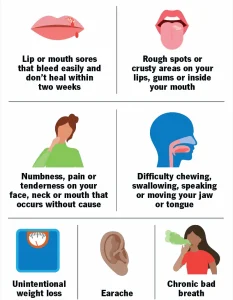Overview
Diagnosis
Tests and procedures used to diagnose floor of the mouth cancer may include:
-
Examining your mouth and neck: During a physical exam, a health care professional looks inside your mouth and feels your neck for any lumps. The provider checks for swollen lymph nodes, as floor of the mouth cancer often spreads to the lymph nodes first.
-
Removing a tissue sample for testing: A biopsy involves taking a small sample of cells or tissue from the suspicious area. This may be done by cutting out a piece of tissue or using a thin needle to collect cells. The sample is tested in a lab to determine whether the cells are cancerous.
-
Imaging tests: Imaging helps identify the size and spread of the tumor. Tests may include X-rays, CT scans, MRI, or positron emission tomography (PET) scans. These scans provide detailed images to help guide diagnosis and treatment planning.
Treatment
Treatment for floor of the mouth cancer usually starts with surgery and may be followed by radiation, chemotherapy, or a combination of therapies. The treatment plan depends on factors such as the cancer’s stage, size, location, and whether it has spread to lymph nodes or other areas.
Surgery
Surgery is the most common treatment for this type of cancer and may include:
-
Surgery to remove the cancer: The surgeon removes the tumor and a margin of healthy tissue to ensure all cancer cells are eliminated. If the cancer has spread to the jaw or tongue, those areas may need partial removal. After surgery, some people may experience changes in speech or swallowing, for which rehabilitation therapy can help.
-
Surgery to remove lymph nodes: If cancer spreads to the neck, lymph nodes may be removed through a procedure called neck dissection. Even when no cancer is visible in the lymph nodes, some may be removed as a precaution to assess the spread. In some cases, a sentinel node biopsy is performed to remove and test only a few key lymph nodes.
-
Reconstructive surgery: When parts of the mouth, jaw, or face are removed, reconstructive surgery helps restore appearance and function. Tissue or bone may be taken from another part of the body to rebuild the affected area.
Other Treatments
Additional treatment options may include:
-
Radiation therapy: High-energy beams such as X-rays or protons target and kill cancer cells. Radiation may be used after surgery to eliminate remaining cancer cells or as the primary treatment if surgery is not an option.
-
Chemotherapy: Powerful medicines are used to destroy cancer cells. Chemotherapy may be combined with radiation to improve effectiveness or given after surgery to prevent recurrence.
-
Targeted therapy: These medicines specifically attack cancer cell proteins or genes that help them grow and spread. Targeted therapy is often used for advanced or recurrent cancer.
-
Immunotherapy: This treatment boosts the body’s immune system to detect and destroy cancer cells that previously went unnoticed. It’s typically used when other treatments are not effective.
-
Photodynamic therapy: A light-sensitive medicine is applied to the tumor area, then activated with a special light to kill cancer cells. This method may be suitable for small or early-stage cancers.
Treatment for advanced floor of the mouth cancer can affect speech and swallowing. Rehabilitation with speech therapists and nutrition experts plays a key role in helping individuals adjust and recover function after treatment.
Advertisement

